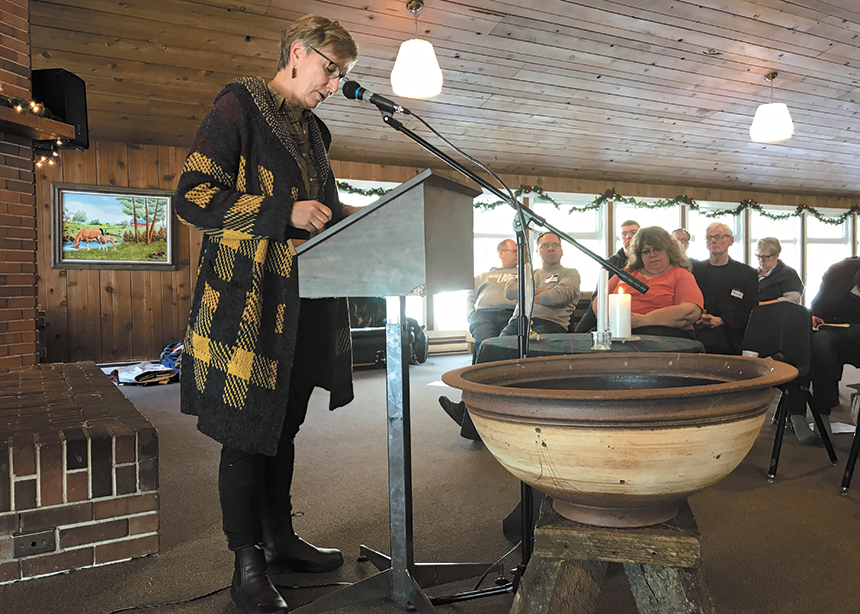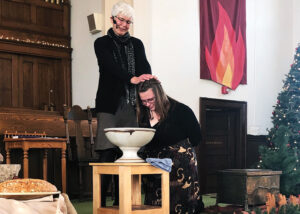We are witnessing the first time in history when many young people in Mennonite Church Canada congregations are actively participating in the church but are choosing not to be baptized. Why is that? Irma Fast Dueck, associate professor of practical theology at Canadian Mennonite University (CMU), is researching exactly that question.
Fast Dueck, who attends Bethel Mennonite Church in Winnipeg, started diving into the baptism question about ten years ago. She has led numerous workshops in churches and in February 2019, she delivered Conrad Grebel University College’s Bechtel Lecture, titled, “Take Me to the Waters: Baptism, Commitment and the Church.” She started writing a book on baptism in 2013, which she’s hoping to finish on her sabbatical during the winter 2020 semester.
Fast Dueck recently worked with more than 40 pastors and lay leaders from Mennonite Church Manitoba (MCM) congregations, presenting the topic “Re-Learning to Swim in Baptismal Waters” at MCM’s Leadership Day on Nov. 27.
“I loved it,” she says. “It was great to hear from pastors.” They were eager to learn and discuss, which hasn’t always been the case. “When I started, it felt like no one really wanted to talk about baptism. . .but it’s like it’s suddenly beginning to dawn on people how important rituals are to the life of the church.”
The leadership day at Camp Assiniboia began by diving into Fast Dueck’s findings on why young people are choosing not to be baptized. Pastors around the room then shared what they have heard from young people. They confirmed that baptism is still important to pastors and they brainstormed ideas of how they could highlight baptism in the church.
“In some ways it makes you feel like as congregations we’re not alone,” says Marla Langelotz, lead pastor at Sargent Avenue Mennonite Church (SAMC), who attended the leadership day. “This is a larger reality and time in our life as a church, which means it’s valuable to assess and think again.”
Fast Dueck’s interest in baptism was sparked when she was teaching about baptism and she asked the class of 70 people how many would identify as Christian. About 80 percent raised their hands. When she asked who was baptized, only about seven said they were.
“I thought, what is going on here? These are people that identify as Christian and are involved in the church, working at camps, teaching Sunday school. Why aren’t those people getting baptized?” says Fast Dueck.
Through a research study by CMU students Peter Epp and Joseph Kiranto, she learned that young people had a high view of the church, not a low one. Because of this high view, some felt they weren’t good enough to be baptized, that they didn’t live up to the church’s standards. Others felt the church wasn’t meeting their high expectations of what it should be, and they didn’t want to be identified with the homophobia and colonial and ecologically destructive actions they saw happening in the church. Some placed such a heavy importance on the event of baptism, similar to how some treat wedding days, that they thought if they didn’t love the pastor or didn’t know everything the church teaches by that day, they shouldn’t be baptized. Still others equated baptism with membership, which to them meant endless committees and institutional proceedings.
However, Fast Dueck argues that baptism is still an important part of the church. Mennonites lack a ritual sensibility because early Anabaptists pushed against its strong influence during the Reformation. But we need it. “The symbol and the ritual is such a gift to a world that’s so logical and rational and word-oriented,” she says. “It’s important for us not just to let this go,” says Langelotz. “There’s something in ritual that holds us and continues to form us and keep the faith going and vibrant.”
So how do we create a baptismal ecology in the church?, Fast Dueck asked the gathered pastors. First, we need to stop thinking about baptism as a one-day event, but instead as a spiritual journey and practice. Langelotz suggests using baptismal language in more than just baptism services, putting up symbols of baptism around the church and having photographs available to help us remember.
“One of the things that struck me was how little we talk about baptism,” Langelotz says. If churches aren’t doing many baptisms, youth don’t see it and have less imagination for it. At SAMC, they have missed the lectionary text of Jesus’ baptism for multiple years in a row because they have done a sermon series every January. “So here’s a Sunday where we could be thinking about baptism and the act of baptism being an act of resistance really … I wonder whether that would actually fire the imaginations of some of our people.”
Several pastors shared stories at the leadership day of how baptism has changed their lives, which “is a way to strengthen the community imagination of baptism,” says Langelotz. They closed the day with a worship service in which pastors re-affirmed their own baptismal vows.
Related stories:
‘Ramping up the rituals’
Youth panel explains what keeps them in the church








Leave a Reply
You must be logged in to post a comment.